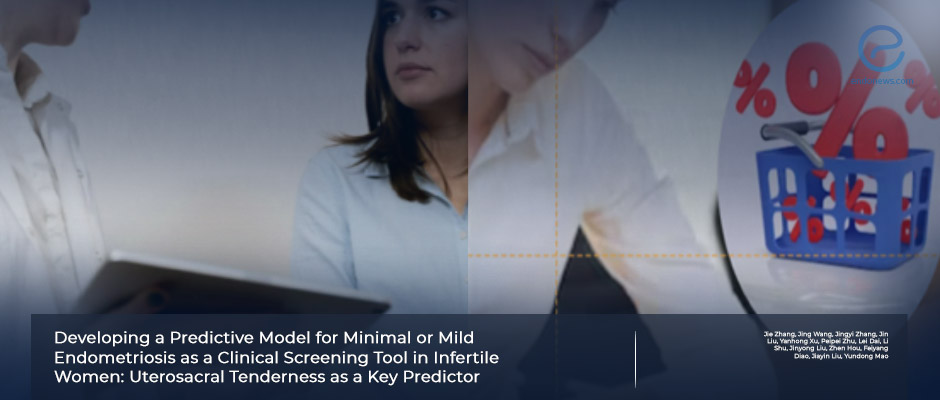New Predictive Model Can Identify Minimal and Mild Endometriosis
Mar 26, 2024
A new model could identify minimal and mild endometriosis in infertile women, thereby facilitating early diagnosis and treatment.
Key Points
Highlights:
- Researchers developed a new model that can predict minimal or mild endometriosis in infertile women.
Importance:
- This model could help to screen infertile women for minimal or mild endometriosis and may assist in early diagnosis and treatment.
What’s done here:
- Researchers conducted a retrospective cohort study on 1365 infertile women who underwent laparoscopy.
Key results:
- The best-performing model included body mass index, dysmenorrhea, dyspareunia, uterosacral tenderness, and serum cancer antigen 125 (CA-125).
- The sensitivity, specificity, and area under the curve (AUC) or the nomogram based on this model were high for both the training and validation sets.
- Uterosacral tenderness was the most valuable predictor of minimal or mild endometriosis.
Lay Summary
Researchers from China developed a predictive model that can identify minimal and mild endometriosis in infertile women. The paper appeared in the March 2024 issue of the Journal of Minimally Invasive Gynecology.
“This model would assist clinicians in screening infertile women for minimal or mild endometriosis, thereby facilitating early diagnosis and treatment,” they wrote in a report that they published in the Journal of Minimally Invasive Gynecology.
It can be difficult to accurately identify endometriosis, especially in the early stages of the disease. This means that many women can go undiagnosed for many years and not receive the treatment they need and deserve. During this time they can unnecessarily endure the symptoms and complications of the disease such as extreme pelvic pain and infertility.
To develop a noninvasive predictive model that can identify minimal or mild endometriosis in women with infertility, the team led by Dr. Yundong Mao from the State Key Laboratory of Reproductive Medicine at the Clinical Center of Reproductive Medicine, The First Affiliated Hospital of Nanjing Medical University in China conducted a retrospective cohort study in 1365 infertile women who underwent laparoscopy between January 2013 and August 2020.
The researchers divided the patients into 2 groups: the training group of 910 women to develop the model and the validation set of 455 women to validate the predictive efficacy of the model.
Of the 910 women in the training set, 587 had minimal or mild endometriosis while 323 did not have endometriosis.
The best-performing model included body mass index, dysmenorrhea, dyspareunia, uterosacral tenderness, and serum cancer antigen 125 (CA-125).
The nomogram based on this model had a sensitivity of 87.7% for the training set and 93.3% for the validation set. The specificity was 68.6% for the training set and 66.4% for the validation set, and the area under the curve was 0.84 for the training set and 0.85 for the validation set.
The researchers reported that the model had good calibration and clinical value based on the evaluation of calibration and decision curves.
Uterosacral tenderness was the most valuable predictor of minimal or mild endometriosis.
“This study successfully developed a predictive model with high accuracy in identifying infertile women with minimal or mild endometriosis based on clinical characteristics, signs, and cost-effective blood tests,” the researchers concluded.
Research Source: https://pubmed.ncbi.nlm.nih.gov/38147937/
minimal endometriosis mild endometriosis endometriosis stage early diagnosis non-invasive diagnisis machine learning nomogram.

